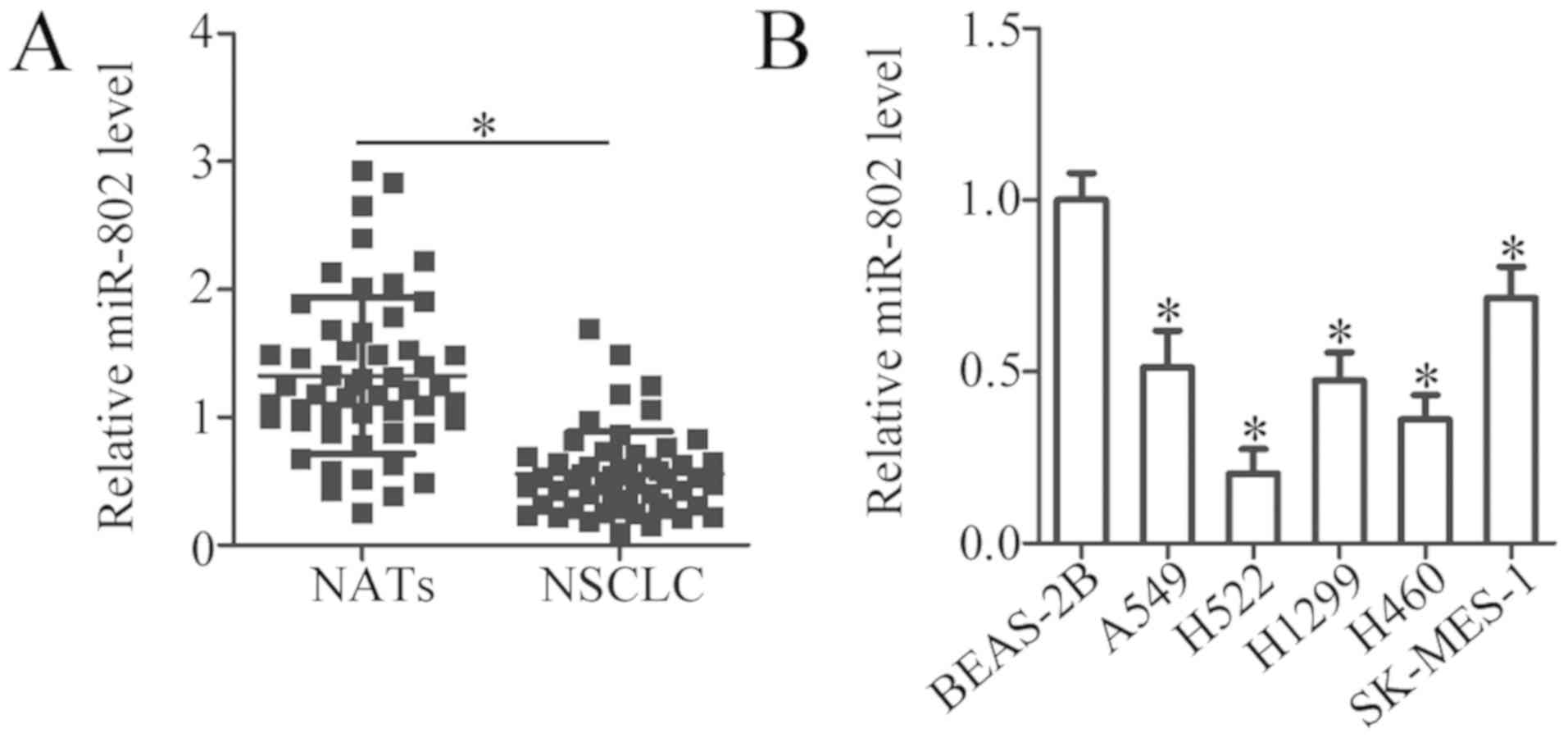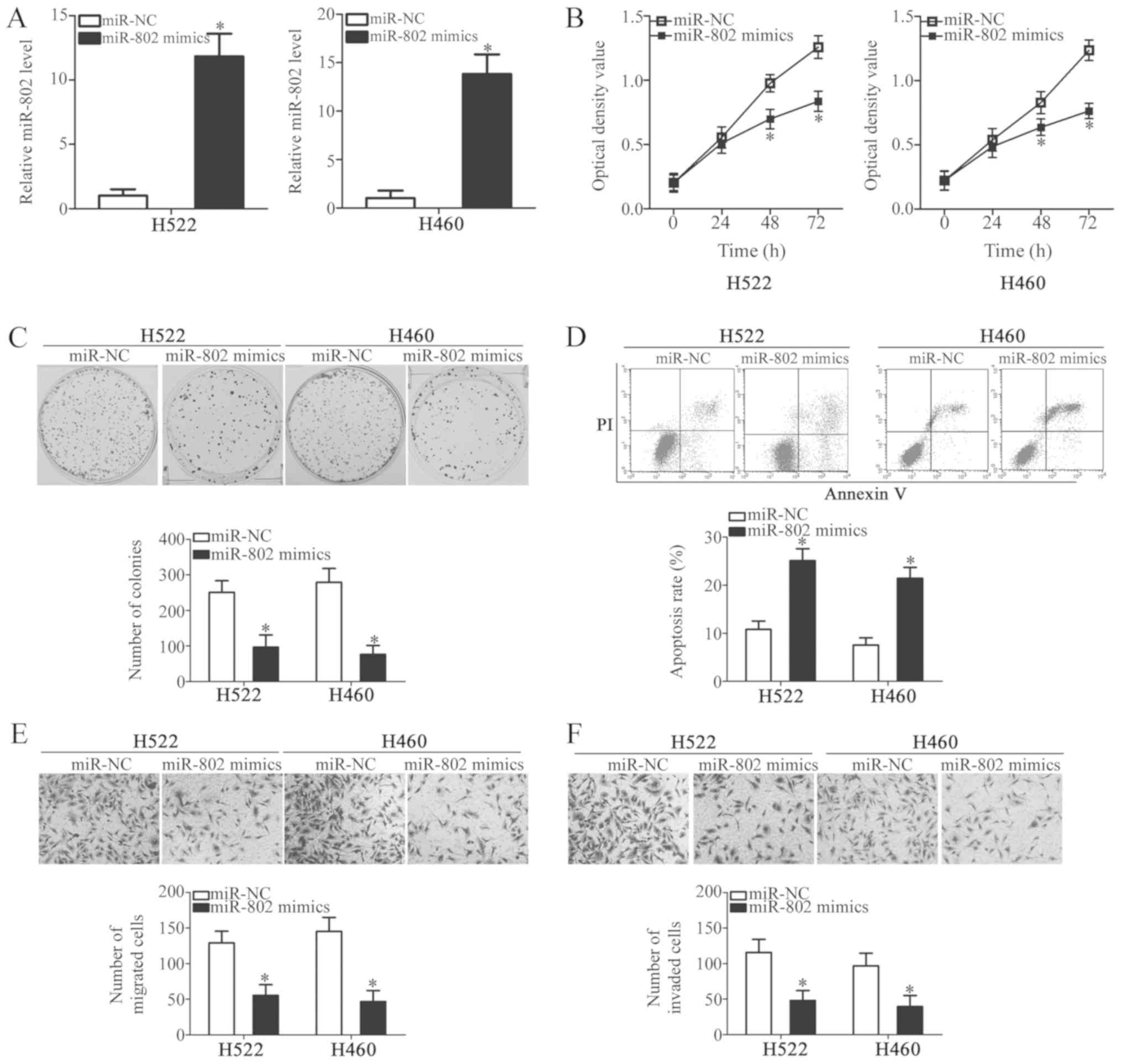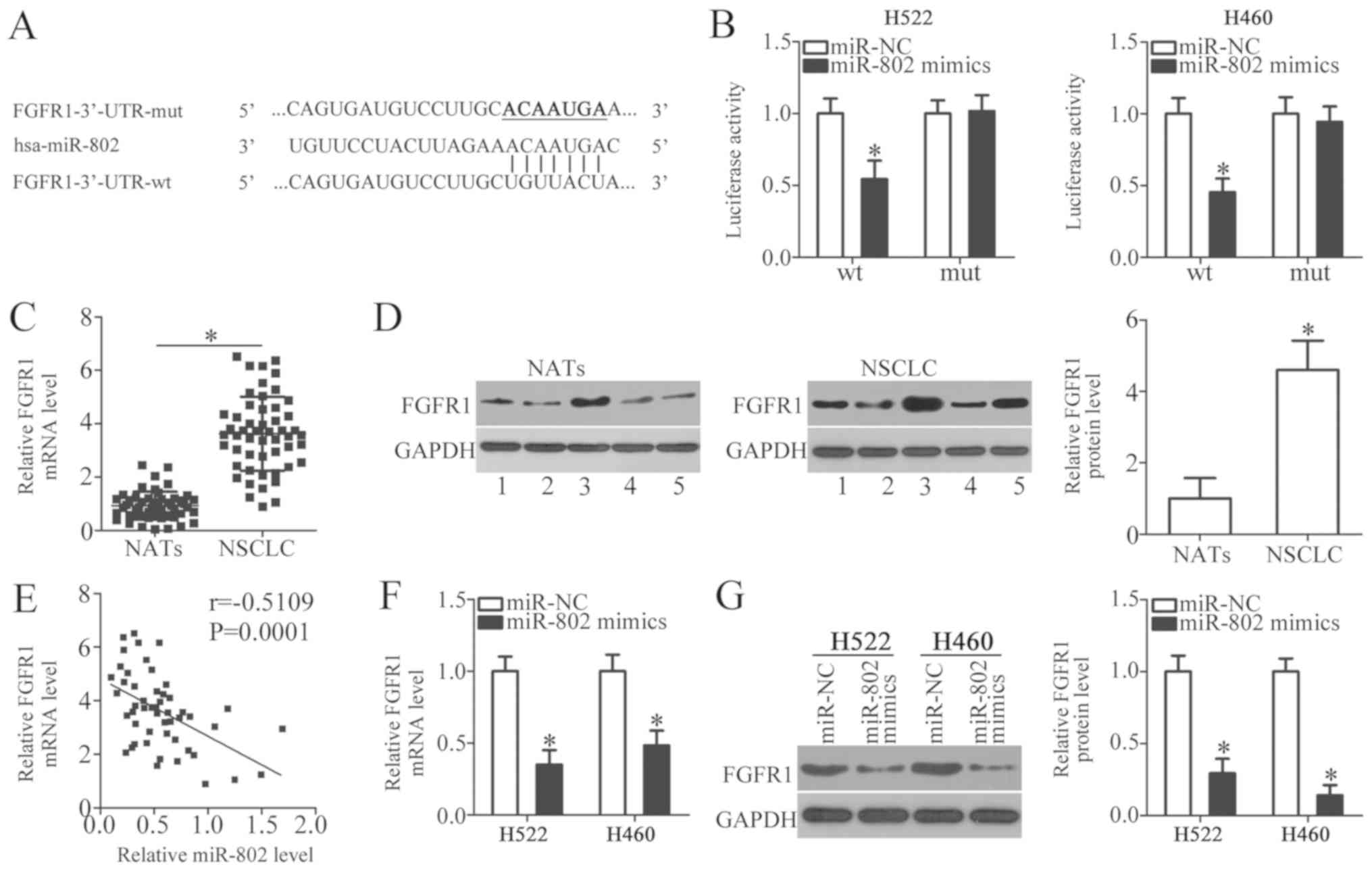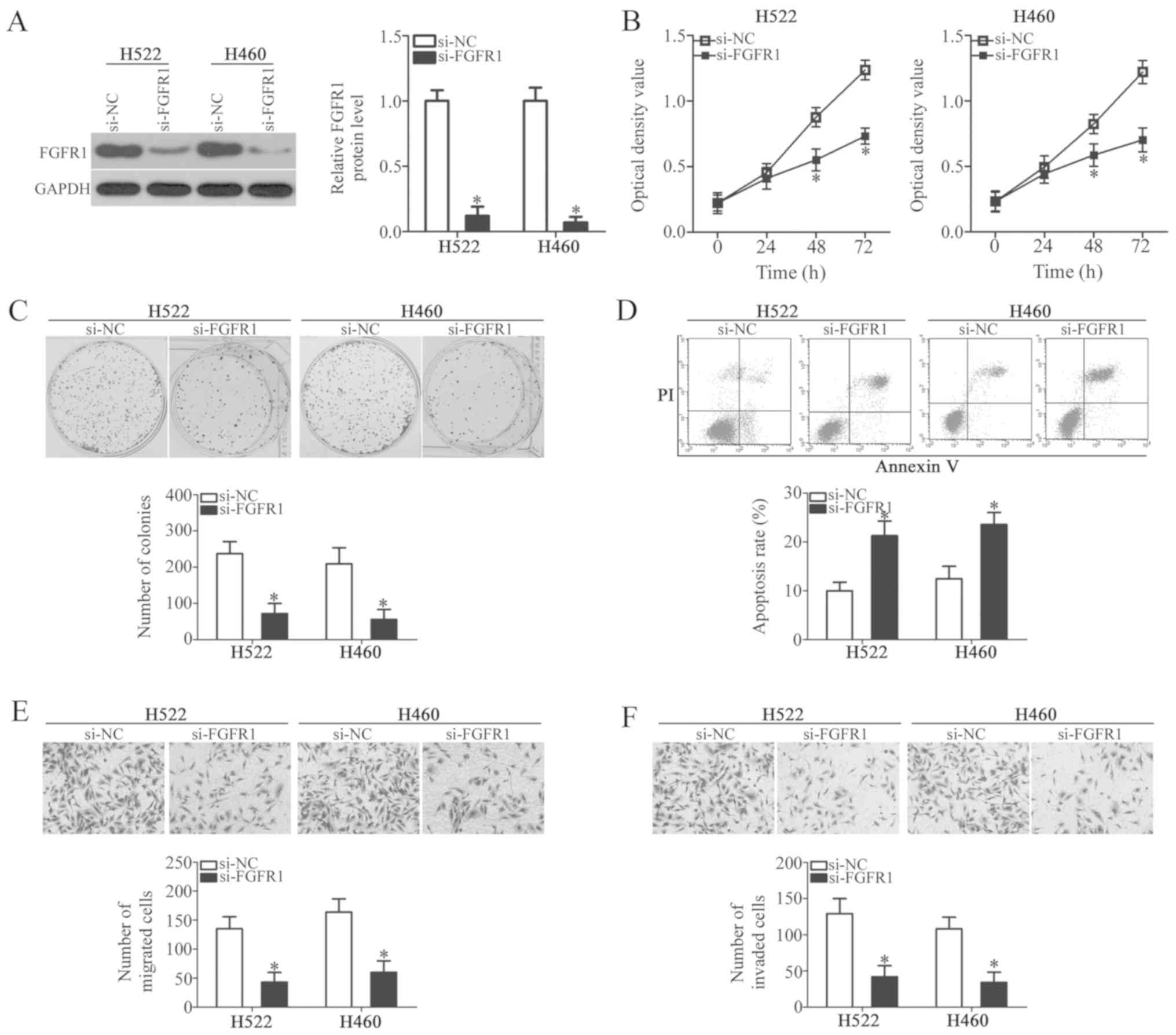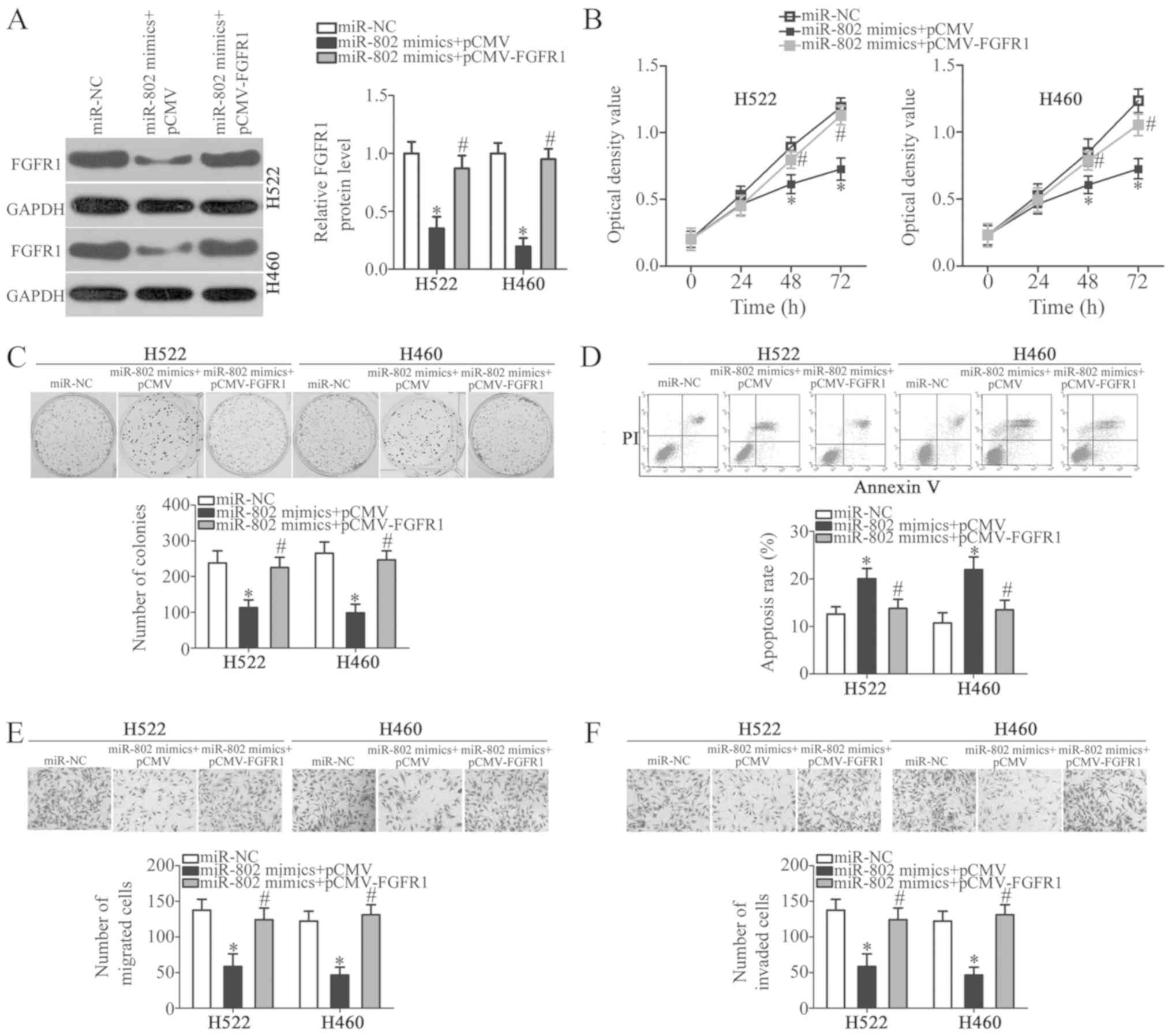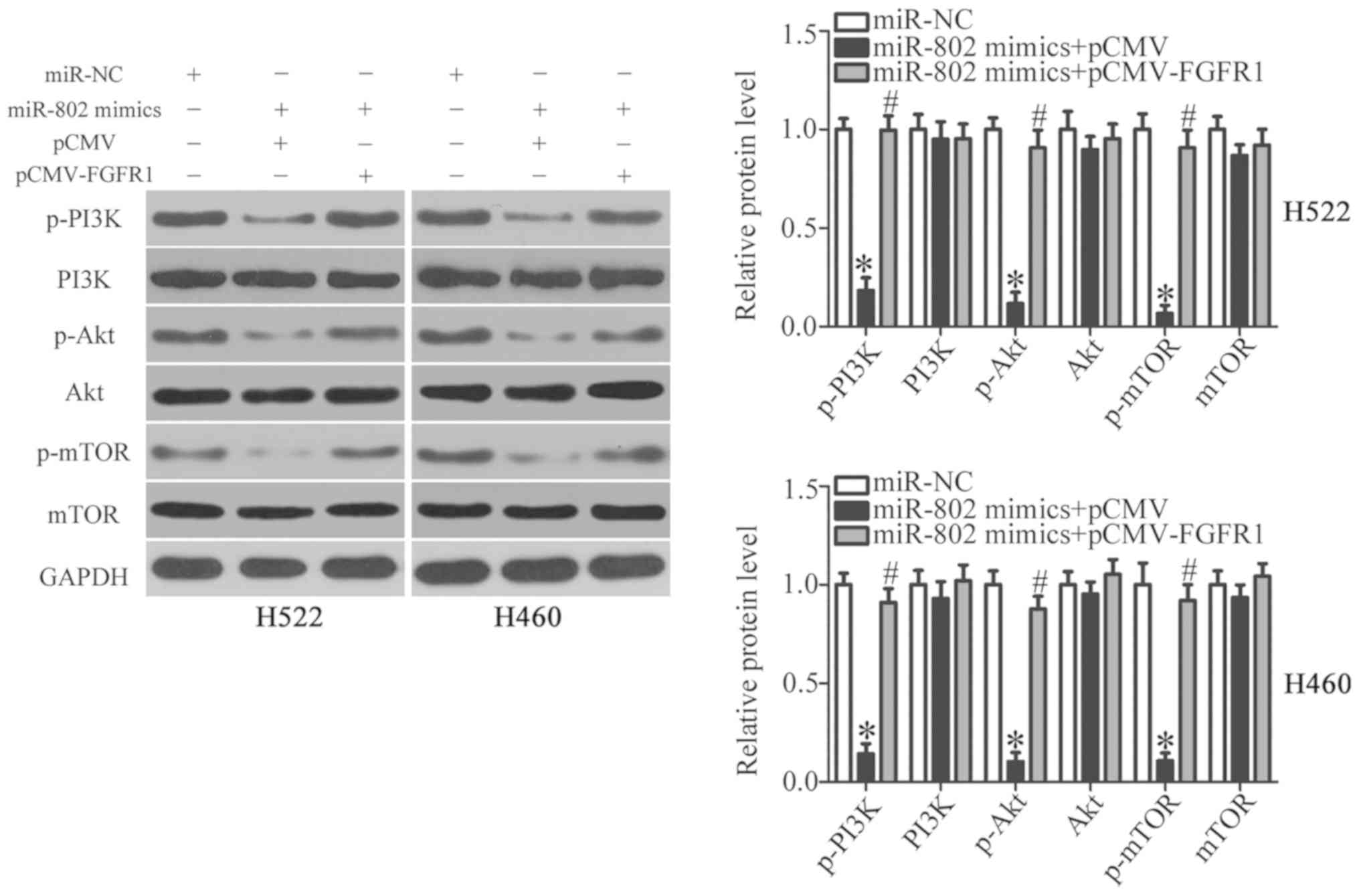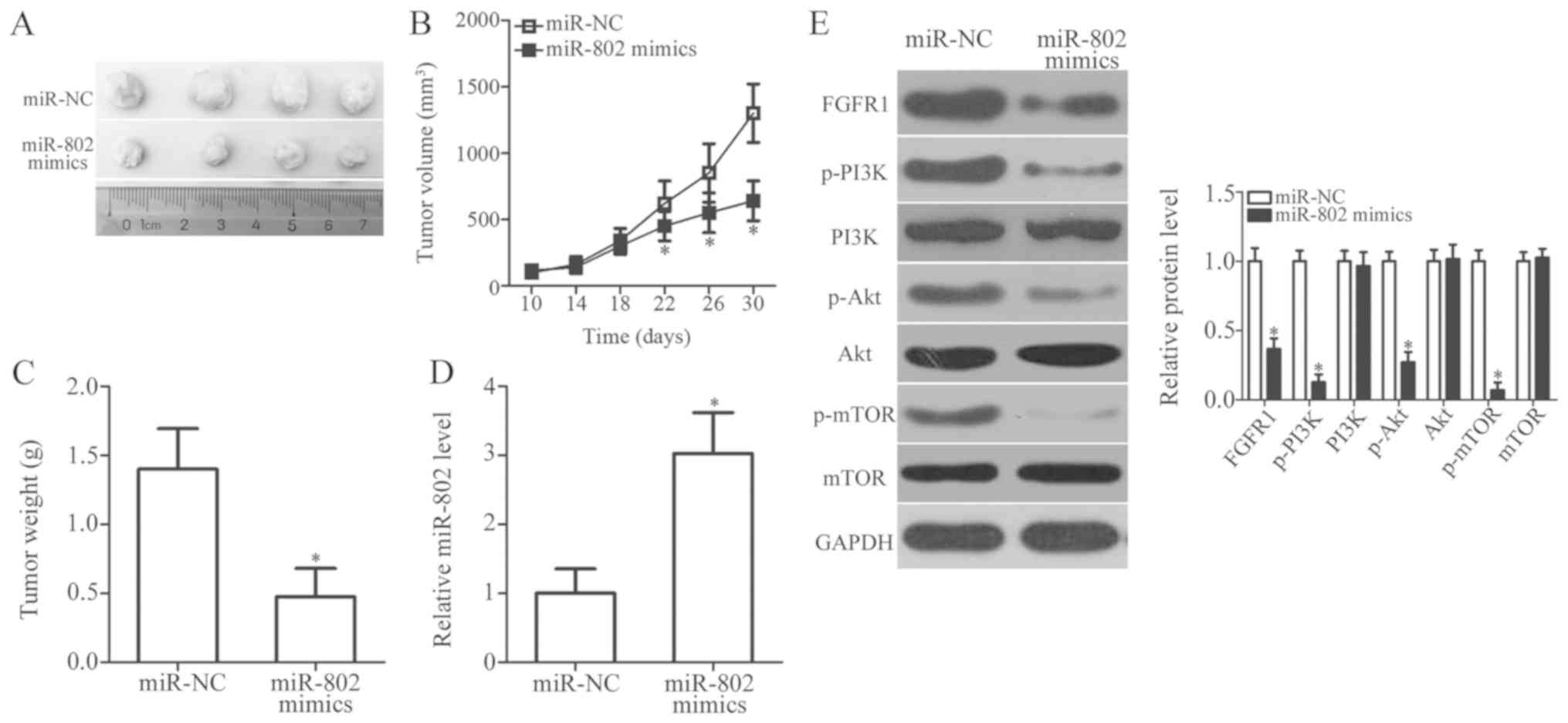|
1
|
Torre LA, Bray F, Siegel RL, Ferlay J,
Lortet-Tieulent J and Jemal A: Global cancer statistics, 2012. CA
Cancer J Clin. 65:87–108. 2015. View Article : Google Scholar : PubMed/NCBI
|
|
2
|
Siegel RL, Miller KD and Jemal A: Cancer
statistics, 2016. CA Cancer J Clin. 66:7–30. 2016. View Article : Google Scholar : PubMed/NCBI
|
|
3
|
Fiteni F, Anota A, Westeel V and Bonnetain
F: Methodology of health-related quality of life analysis in phase
III advanced non-small-cell lung cancer clinical trials: A critical
review. BMC Cancer. 16:1222016. View Article : Google Scholar : PubMed/NCBI
|
|
4
|
Ettinger DS, Akerley W, Bepler G, Blum MG,
Chang A, Cheney RT, Chirieac LR, D’Amico TA, Demmy TL, Ganti AK, et
al NCCN Non-Small Cell Lung Cancer Panel Members: Non-small cell
lung cancer. J Natl Compr Canc Netw. 8:740–801. 2010. View Article : Google Scholar : PubMed/NCBI
|
|
5
|
Zarogoulidis K, Zarogoulidis P, Darwiche
K, Boutsikou E, Machairiotis N, Tsakiridis K, Katsikogiannis N,
Kougioumtzi I, Karapantzos I, Huang H, et al: Treatment of
non-small cell lung cancer (NSCLC). J Thorac Dis. 5(Suppl 4):
S389–S396. 2013.PubMed/NCBI
|
|
6
|
Schabath MB, Nguyen A, Wilson P, Sommerer
KR, Thompson ZJ and Chiappori AA: Temporal trends from 1986 to 2008
in overall survival of small cell lung cancer patients. Lung
Cancer. 86:14–21. 2014. View Article : Google Scholar : PubMed/NCBI
|
|
7
|
Li Z, Song Y, Liu L, Hou N, An X, Zhan D,
Li Y, Zhou L, Li P, Yu L, et al: miR-199a impairs autophagy and
induces cardiac hypertrophy through mTOR activation. Cell Death
Differ. 24:1205–1213. 2017. View Article : Google Scholar :
|
|
8
|
Mao M, Wu Z and Chen J: MicroRNA-187-5p
suppresses cancer cell progression in non-small cell lung cancer
(NSCLC) through down-regulation of CYP1B1. Biochem Biophys Res
Commun. 478:649–655. 2016. View Article : Google Scholar : PubMed/NCBI
|
|
9
|
Kim VN: MicroRNA biogenesis: Coordinated
cropping and dicing. Nat Rev Mol Cell Biol. 6:376–385. 2005.
View Article : Google Scholar : PubMed/NCBI
|
|
10
|
Calin GA and Croce CM: MicroRNA signatures
in human cancers. Nat Rev Cancer. 6:857–866. 2006. View Article : Google Scholar : PubMed/NCBI
|
|
11
|
Bartel DP: MicroRNAs: Target recognition
and regulatory functions. Cell. 136:215–233. 2009. View Article : Google Scholar : PubMed/NCBI
|
|
12
|
Aigner A: MicroRNAs (miRNAs) in cancer
invasion and metastasis: Therapeutic approaches based on
metastasis-related miRNAs. J Mol Med (Berl). 89:445–457. 2011.
View Article : Google Scholar
|
|
13
|
Rottiers V and Näär AM: MicroRNAs in
metabolism and metabolic disorders. Nat Rev Mol Cell Biol.
13:239–250. 2012. View
Article : Google Scholar : PubMed/NCBI
|
|
14
|
Cho WC: MicroRNAs: Potential biomarkers
for cancer diagnosis, prognosis and targets for therapy. Int J
Biochem Cell Biol. 42:1273–1281. 2010. View Article : Google Scholar
|
|
15
|
Bienertova-Vasku J, Sana J and Slaby O:
The role of microRNAs in mitochondria in cancer. Cancer Lett.
336:1–7. 2013. View Article : Google Scholar : PubMed/NCBI
|
|
16
|
Bouyssou JM, Manier S, Huynh D, Issa S,
Roccaro AM and Ghobrial IM: Regulation of microRNAs in cancer
metastasis. Biochim Biophys Acta. 1845:255–265. 2014.PubMed/NCBI
|
|
17
|
Lang Y, Xu S, Ma J, Wu J, Jin S, Cao S and
Yu Y: MicroRNA-429 induces tumorigenesis of human non-small cell
lung cancer cells and targets multiple tumor suppressor genes.
Biochem Biophys Res Commun. 450:154–159. 2014. View Article : Google Scholar : PubMed/NCBI
|
|
18
|
Wang K, Dong L, Fang Q, Xia H and Hou X:
Low serum miR-98 as an unfavorable prognostic biomarker in patients
with non-small cell lung cancer. Cancer Biomark. 20:283–288. 2017.
View Article : Google Scholar : PubMed/NCBI
|
|
19
|
Wang L, Qu J, Zhou L, Liao F and Wang J:
MicroRNA-373 Inhibits Cell Proliferation and Invasion via Targeting
BRF2 in Human Non-small Cell Lung Cancer A549 Cell Line. Cancer Res
Treat. 50:936–949. 2018. View Article : Google Scholar :
|
|
20
|
Li T, Ding ZL, Zheng YL and Wang W:
MiR-484 promotes non-small-cell lung cancer (NSCLC) progression
through inhibiting Apaf-1 associated with the suppression of
apoptosis. Biomed Pharmacother. 96:153–164. 2017. View Article : Google Scholar : PubMed/NCBI
|
|
21
|
Jiang W, Wei K, Pan C, Li H, Cao J, Han X,
Tang Y, Zhu S, Yuan W, He Y, et al: MicroRNA-1258 suppresses tumour
progression via GRB2/Ras/Erk pathway in non-small-cell lung cancer.
Cell Prolif. 51:e125022018. View Article : Google Scholar : PubMed/NCBI
|
|
22
|
Lu J, Zhan Y, Feng J, Luo J and Fan S:
MicroRNAs associated with therapy of non-small cell lung cancer.
Int J Biol Sci. 14:390–397. 2018. View Article : Google Scholar : PubMed/NCBI
|
|
23
|
Zhou Q, Huang SX, Zhang F, Li SJ, Liu C,
Xi YY, Wang L, Wang X, He QQ, Sun CC, et al: MicroRNAs: A novel
potential biomarker for diagnosis and therapy in patients with
non-small cell lung cancer. Cell Prolif. 50:502017. View Article : Google Scholar
|
|
24
|
Florczuk M, Szpechcinski A and
Chorostowska-Wynimko J: miRNAs as Biomarkers and Therapeutic
Targets in Non-Small Cell Lung Cancer: Current Perspectives. Target
Oncol. 12:179–200. 2017. View Article : Google Scholar : PubMed/NCBI
|
|
25
|
Wang D, Lu G, Shao Y and Xu D:
microRNA-802 inhibits epithelial-mesenchymal transition through
targeting flotillin-2 in human prostate cancer. Biosci Rep.
37:372017. View Article : Google Scholar
|
|
26
|
Wu X, Gong Z, Sun L, Ma L and Wang Q:
MicroRNA-802 plays a tumour suppressive role in tongue squamous
cell carcinoma through directly targeting MAP2K4. Cell Prolif.
50:502017. View Article : Google Scholar
|
|
27
|
Yuan F and Wang W: MicroRNA-802 suppresses
breast cancer proliferation through downregulation of FoxM1. Mol
Med Rep. 12:4647–4651. 2015. View Article : Google Scholar : PubMed/NCBI
|
|
28
|
Zhang XY, Mu JH, Liu LY and Zhang HZ:
Upregulation of miR-802 suppresses gastric cancer oncogenicity via
targeting RAB23 expression. Eur Rev Med Pharmacol Sci.
21:4071–4078. 2017.PubMed/NCBI
|
|
29
|
Cao ZQ, Shen Z and Huang WY: MicroRNA-802
promotes osteosarcoma cell proliferation by targeting p27. Asian
Pac J Cancer Prev. 14:7081–7084. 2013. View Article : Google Scholar
|
|
30
|
Livak KJ and Schmittgen TD: Analysis of
relative gene expression data using real-time quantitative PCR and
the 2(-Delta Delta C(T)) method. Methods. 25:402–408. 2001.
View Article : Google Scholar
|
|
31
|
Volm M, Koomägi R, Mattern J and Stammler
G: Prognostic value of basic fibroblast growth factor and its
receptor (FGFR-1) in patients with non-small cell lung carcinomas.
Eur J Cancer. 33:691–693. 1997. View Article : Google Scholar : PubMed/NCBI
|
|
32
|
Tran TN, Selinger CI, Kohonen-Corish MR,
McCaughan BC, Kennedy CW, O’Toole SA and Cooper WA: Fibroblast
growth factor receptor 1 (FGFR1) copy number is an independent
prognostic factor in non-small cell lung cancer. Lung Cancer.
81:462–467. 2013. View Article : Google Scholar : PubMed/NCBI
|
|
33
|
Tan Q, Wang Z, Wang Q, Wang Y, Huang Z, Su
N, Jin M, Kuang L, Qi H, Ni Z, et al: A novel FGFR1-binding peptide
exhibits anti-tumor effect on lung cancer by inhibiting
proliferation and angiogenesis. Int J Biol Sci. 14:1389–1398. 2018.
View Article : Google Scholar : PubMed/NCBI
|
|
34
|
Yuan H, Li ZM, Shao J, Ji WX, Xia W and Lu
S: FGF2/FGFR1 regulates autophagy in FGFR1-amplified non-small cell
lung cancer cells. J Exp Clin Cancer Res. 36:722017. View Article : Google Scholar : PubMed/NCBI
|
|
35
|
Ji W, Yu Y, Li Z, Wang G, Li F, Xia W and
Lu S: FGFR1 promotes the stem cell-like phenotype of
FGFR1-amplified non-small cell lung cancer cells through the
Hedgehog pathway. Oncotarget. 7:15118–15134. 2016.PubMed/NCBI
|
|
36
|
Schultheis AM, Bos M, Schmitz K, Wilsberg
L, Binot E, Wolf J, Büttner R and Schildhaus HU: Fibroblast growth
factor receptor 1 (FGFR1) amplification is a potential therapeutic
target in small-cell lung cancer. Mod Pathol. 27:214–221. 2014.
View Article : Google Scholar
|
|
37
|
Mano Y, Takahashi K, Ishikawa N, Takano A,
Yasui W, Inai K, Nishimura H, Tsuchiya E, Nakamura Y and Daigo Y:
Fibroblast growth factor receptor 1 oncogene partner as a novel
prognostic biomarker and therapeutic target for lung cancer. Cancer
Sci. 98:1902–1913. 2007. View Article : Google Scholar : PubMed/NCBI
|
|
38
|
Hu P, Chen H, McGowan EM, Ren N, Xu M and
Lin Y: Assessment of FGFR1 Over-Expression and Over-Activity in
Lung Cancer Cells: A Toolkit for Anti-FGFR1 Drug Screening. Hum
Gene Ther Methods. 29:30–43. 2018. View Article : Google Scholar
|
|
39
|
Liu H, Ma Y, Liu C, Li P and Yu T: Reduced
miR-125a-5p level in non-small-cell lung cancer is associated with
tumour progression. Open Biol. 8:82018. View Article : Google Scholar
|
|
40
|
Xu BB, Gu ZF, Ma M, Wang JY and Wang HN:
MicroRNA-590-5p suppresses the proliferation and invasion of
non-small cell lung cancer by regulating GAB1. Eur Rev Med
Pharmacol Sci. 22:5954–5963. 2018.PubMed/NCBI
|
|
41
|
Yang D, Li JS, Xu QY, Xia T and Xia JH:
Inhibitory Effect of MiR-449b on Cancer Cell Growth and Invasion
through LGR4 in Non-Small-Cell Lung Carcinoma. Curr Med Sci.
38:582–589. 2018. View Article : Google Scholar : PubMed/NCBI
|
|
42
|
Jiang M, Li X, Quan X, Li X and Zhou B:
Clinically Correlated MicroRNAs in the Diagnosis of Non-Small Cell
Lung Cancer: A Systematic Review and Meta-Analysis. BioMed Res Int.
2018:59309512018. View Article : Google Scholar : PubMed/NCBI
|
|
43
|
Turner CA, Calvo N, Frost DO, Akil H and
Watson SJ: The fibroblast growth factor system is downregulated
following social defeat. Neurosci Lett. 430:147–150. 2008.
View Article : Google Scholar
|
|
44
|
Devilard E, Bladou F, Ramuz O, Karsenty G,
Dalès JP, Gravis G, Nguyen C, Bertucci F, Xerri L and Birnbaum D:
FGFR1 and WT1 are markers of human prostate cancer progression. BMC
Cancer. 6:2722006. View Article : Google Scholar : PubMed/NCBI
|
|
45
|
Schäfer MH, Lingohr P, Sträßer A, Lehnen
NC, Braun M, Perner S, Höller T, Kristiansen G, Kalff JC and
Gütgemann I: Fibroblast growth factor receptor 1 gene amplification
in gastric adenocarcinoma. Hum Pathol. 46:1488–1495. 2015.
View Article : Google Scholar : PubMed/NCBI
|
|
46
|
Göke F, Göke A, von Mässenhausen A,
Franzen A, Sharma R, Kirsten R, Böhm D, Kristiansen G, Stenzinger
A, Wynes M, et al: Fibroblast growth factor receptor 1 as a
putative therapy target in colorectal cancer. Digestion.
88:172–181. 2013. View Article : Google Scholar : PubMed/NCBI
|
|
47
|
Cheng CL, Thike AA, Tan SY, Chua PJ, Bay
BH and Tan PH: Expression of FGFR1 is an independent prognostic
factor in triple-negative breast cancer. Breast Cancer Res Treat.
151:99–111. 2015. View Article : Google Scholar : PubMed/NCBI
|
|
48
|
Miao JL, Liu RJ, Zhou JH and Meng SH:
Fibroblast Growth Factor Receptor 1 Gene Amplification in Nonsmall
Cell Lung Cancer. Chin Med J (Engl). 129:2868–2872. 2016.
View Article : Google Scholar
|















